Mercury and Maia inside a silver cup dedicated by the freedman P. Aelius Eutychus, from a Gallo-Roman religious site, late 2nd C. CE
"Maia in ancient Greek religion, is one of the Pleiades and the mother of Hermes by Zeus. Maia is the daughter of Atlas and Pleione the Oceanid, and is the oldest of the seven Pleiades. They were born on Mount Cyllene in Arcadia, and are sometimes called mountain nymphs, oreads; Simonides of Ceos sang of "mountain Maia" (Maiados oureias) "of the lovely black eyes." Because they were daughters of Atlas, they were also called the Atlantides.
The month of May (Latin Maius) was supposedly named for Maia, though ancient etymologists also connected it to the maiores "ancestors", again from the adjective maius, maior, meaning those who are "greater" in terms of generational precedence. On the first day of May, the Lares Praestites were honored as protectors of the city, and the flamen of Vulcan sacrificed a pregnant sow to Maia, a customary offering to an earth Goddess that reiterates the link between Vulcan and Maia in the archaic prayer formula. In Roman myth, Mercury (Hermes), the son of Maia, was the father of the twin Lares, a genealogy that sheds light on the collocation of ceremonies on the Kalends of May. On May 15, the Ides, Mercury was honored as a patron of merchants and increaser of profit (through an etymological connection with merx, merces, "goods, merchandise"), another possible connection with Maia his mother as a Goddess who promoted growth."



Comments
Post a Comment